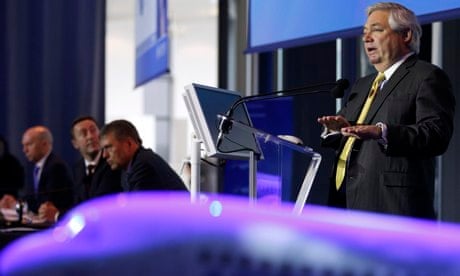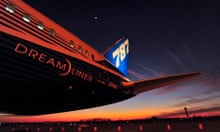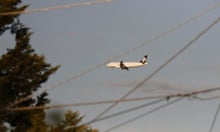Airbus achieved record sales and deliveries of aircraft in 2013, the manufacturer has announced, claiming to have edged its great rival Boeing for market share.
But it admitted it would probably hand that particular crown back to its American counterparts in subsequent years to focus on increased production, as its orders have built up a nine-year backlog on deliveries.
Its total of 1,619 aircraft orders, valued at up to $240.5bn, exceeded its 2011 previous best by 11, while the 626 planes delivered represented a 12th consecutive year of growth.
The president and chief executive, Fabrice Bregier, said that with a total of 5,559 outstanding orders, or about nine years of production at current rates, Airbus had an extremely healthy backlog before what would be a significant year.
This year will see the A350 entered into service, a direct competitor in scale to Boeing's pioneering Dreamliner, as well as the first flight of the A320neo, its upgraded bestselling single-aisle plane.
Bregier said the orders had strengthened Airbus's belief that airlines were moving towards buying larger models. "In each category the customer tends to select the slightly bigger aircraft."
He said: "The A350's slightly bigger size makes it more appealing than the [Boeing] 787. This will also be the case for the A380, I am convinced."
While the A380, Airbus's flagship double-decker super jumbo, dominates the market for very large planes, only its most committed customer, Emirates, ordered any of the aircraft in 2013, with an order for 50 in December.
Bregier said the year's other highlights had been the successful test flights of the A350 and the company making a significant breakthrough into the Japanese market – regarded as a Boeing fortress by Airbus – with an order for 31 of the new model.
He said: "We believe that this has a strategic significance for Airbus and the positioning of the A350 in the market."
Bregier said the company would now be focusing on incremental innovations that could quickly be delivered to the marketplace, with the A350 and the A320neo completing the Airbus range for the next 15 to 20 years.
The chief operating officer, John Leahy, said Airbus had now taken 53% market share in revenue and net orders. But Bregier conceded that orders had so outstripped deliveries that the company would be likely to see Boeing back in front in the next few years. But he said: "This is not the biggest challenge for Airbus. My problem is finding slots to deliver."
Airbus is in discussion to extend its Chinese operations, with its final assembly plant in Tianjin having now delivered more than 150 aeroplanes.
While all eyes will be on the A350 when it comes into service later this year, Bregier stressed the plane was based on "much more mature" technology than the Boeing 787, which was plagued by teething problems in 2013, leading to its eventual withdrawal from service.
Bregier meanwhile said that Airbus was still considering asking the European commission to lodge a complaint over what he described as cynical and possibly illegal multibillion-dollar subsidies paid to Boeing by Washington state in the US.



